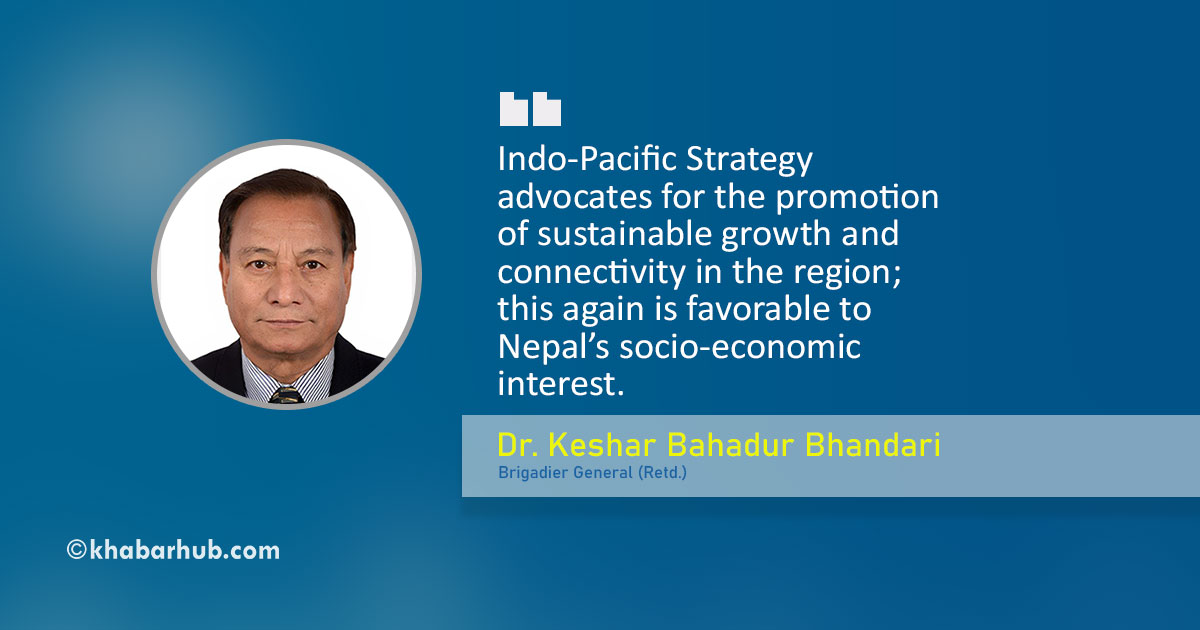Indo-Pacific region carries lots of importance because of its economic, maritime and global shipping, military presence, population and democracy, and the presence of nuclear weapons. Hence, the Indo-Pacific has become the single most consequential region for America’s future; and makes it the US priority theater.
The Indo-Pacific Strategy Report (IPSR), has affirmed the enduring U.S. commitment to stability and prosperity in the region; and also, presented three strategic plan of preparedness, partnerships, and the promotion of a networked region to meet the commitment.
The main focus of preparedness is to achieve peace through strength. The Preparedness talks about having a Joint Force for effective deterrence, combat-credible forces as forward-postured in the region. The effective deterrence of the Joint Force is designed to be achieved through enhanced lethality, resilience, agility, and readiness.
The Indo-Pacific vision has acknowledged the requirement of critical linkages between economics, governance, and security- the three pillars; and sees the US national instruments along with regional allies and partners will ensure peace and prosperity of this region.
The focus of Partnerships is also on establishing Alliances and Partnerships and also expanding and deepening relationships with new partners. It emphasizes on a network of allies and partners to achieve peace, deterrence, and inter-operable war-fighting capability.
The Promotion of a Networked Region is mainly focused on strengthening and evolving U.S. Alliances and Partnerships, and cultivate intra-Asian security relationships.
The main focus is on strengthening regional alliances and developing partnerships, and Nepal is proposed as a new Partner.
The Indo-Pacific vision has acknowledged the requirement of critical linkages between economics, governance, and security- the three pillars; and sees the US national instruments along with regional allies and partners will ensure peace and prosperity of this region.
Both the National Security Strategy and the National Defense Strategy affirm the Indo-Pacific as critical for America’s continued stability, security, and prosperity; and in advancing an international order most conducive to US security and prosperity.
Nepal an emerging Partner
In course of establishing Alliances and Partnerships in South Asia, the US has operationalized major Defense Partnership with India; and is pursuing the emerging partnerships with Sri Lanka, the Maldives, Bangladesh, and Nepal. At the same time, the US is trying to expand and deepen relationships with new partners and have asked Nepal to play a central role in the region.
The region is confronting a myriad of security challenges, including terrorism, transnational crime, trafficking-in-persons, and illicit drugs. To combat these challenges, the United States is seeking opportunities to broaden and strengthen partnerships with India, Sri Lanka, the Maldives, Bangladesh, and Nepal to respond to shared regional challenges.
The United States holds military exercises and military-to-military engagements each year in the Indo-Pacific. To this effort, the US army and Nepal army also conduct joint military exercises and training.
The Indo-Pacific contributes more than one-third of all U.N. peacekeeping personnel, and India, Bangladesh, and Nepal are consistently among the top 10 U.N. peacekeeping contributing countries. The Global Peace Operations Initiative (GPOI) is the U.S. Government’s primary tool to build a partner’s capacity to support U.N. peace operations. The USINDOPACOM maintains strong regional partnerships through GPOI, and Nepal is one of the GPOI’s 12 Indo-Pacific partners.
Moreover, the US engagement at present with Nepal is focused on Humanitarian Assistance and Disaster Relief (HA/DR), peacekeeping operations, defense professionalization, ground force capacity development, and counter-terrorism.
It is interesting to note that the IPSR has identified Nepal as one of the world’s six fastest-growing economies, and the others include India, Cambodia, Laos, Burma, and the Philippines.
While analyzing the US vision for a Free and Open Indo-Pacific, one can make two observations on Nepal. Free Indo-Pacific advocates that all nations regardless of size are able to exercise their sovereignty free from coercion by other countries.
This is in favor of the small and weak nations and naturally is favorable to the national security interest of Nepal. Similarly, open Indo-Pacific advocates for the promotion of sustainable growth and connectivity in the region; this again is favorable to Nepal’s socio-economic interest.
Relations through IPS
The United States seeks to expand defense relationship and partnership with Nepal through IPS. The growing defense partnership program is based on the U.S. Army Pacific-led Land Forces Talks in June 2018, and its promotions are exercised through senior-most military dialogue.
Such, military and diplomatic dialogues are taking place during US senior-level visits to Nepal; and such senior-level visits by the USINDOPACOM Commander, US Assistant Secretary of Defense for Indo-Pacific Security Affairs, Deputy Assistant Secretary of Defense for South and Southeast Asia, Acting Deputy Assistant Secretary of State for South Asia and others have already taken place. Besides, Nepal has recently been added (2019) in the State Partnership Program.
Moreover, the US engagement at present with Nepal is focused on Humanitarian Assistance and Disaster Relief (HA/DR), peacekeeping operations, defense professionalization, ground force capacity development, and counter-terrorism.
China factor
The DoD’s military advantage vis-à-vis China and Russia is eroding – this is the core diagnosis of the US National Defense Strategy. As per the IPSR, Indo-Pacific is confronted with a more confident and assertive China; and China’s Military Modernization, at times, led it to its coercive actions.
At the same time, China is aggressively pushing its Economic Means to advance its Strategic Interests that include the Bridge and Road Initiative (BRI). To address this challenge, DoD is developing a more lethal, resilient, and rapidly innovating Joint Force; and is increasing collaboration with a robust constellation of allies and partners.
Besides, and even more importantly, the US is trying to establish a constructive and results-oriented relationship with China – a far-reaching objective aimed at risk reduction.
Millennium Challenge Corporation and IPS
In 2017, at the APEC Summit in Vietnam, President Donald Trump had announced US vision for a free and open Indo-Pacific – a part of Indo Pacific Strategy. The detail report on “A Free and Open Indo-Pacific – Advancing A Shared Vision” has been published on Nov 4, 2019, but, only after the Indo Pacific Strategy Report of June 2019.
Under “A Free and Open Indo-Pacific” – the US has helped the United Nations (UN) peacekeeping contributing states like Bangladesh and Nepal under the bilateral partnership. To ensure peace and security, the US has trained Indo-Pacific partner countries including Nepal through initiative like the International Military Education and Training Program, and the Department of Defense’s Daniel K. Inouye Asia-Pacific Center for Security Studies (DKI APCSS).
To enhance economic prosperity in the region, the US has supported billions of dollars through the Department of State and USAID for the economic pillar of the Indo-Pacific strategy; and hundreds of millions of dollars through other agencies, including the U.S. Millennium Challenge Corporation (MCC).
The MCC has granted billions of dollars to Indo-Pacific nations including Nepal. The United States has helped Nepal to strengthen the legal and regulatory framework for infrastructure through the Infrastructure Transaction and Assistance Network (ITAN).
The Asia EDGE and related programs have helped to increase the capacity for cross-border electricity trade between Bangladesh, India, and Nepal, and Sri Lanka. In the energy sector, the Asia EDGE helped to draft Nepal’s Energy Regulatory Commission Act, which facilitates energy sector regulation. In Good Governance, Transparency Initiative programs have helped the government strengthen the civil society’s contributions to legislation in Nepal.
After, Nepal became eligible for the MCC in 2011; a five-year Nepal Compact was signed in 2017. The $500 million Nepal Compact is MCC’s first compact in South Asia. The MCC Nepal Compact has two projects – Electricity Transmission Project and Transportation Project.
The Electricity Transmission Project includes the construction of approximately 300 kilometers of high voltage power lines and a second cross-border transmission line – the New Butwal-Gorakhpur cross-border transmission line. The objective of the Transportation Project is to maintain road quality across the 305 kilometers of the strategic road network. The Nepal Compact is designed to increase the availability of electricity and lower the cost of transportation in Nepal to encourage growth, private investment, and job creation.
The above discussions make it obvious that the MCC forms a part of the US vision of ‘A Free and Open Indo-Pacific’, which falls under the Indo-pacific Strategy. Though, both the IPSR and MCC Nepal Compact do not directly mention MCC being a part of IPS; but, the contents make the MCC very much a part of IPS.
This is the reason why; the visiting US high-level official and officials at Kathmandu and Washington have repeatedly asserted the MCC being a part of the Indo-Pacific Strategy. The visiting Acting Deputy Assistant Secretary of State for South Asia David J Ranz and the US Assistant Secretary of Defense for Indo-Pacific Security Affairs Randall Schriver affirmed that the MCC is very much a part of the IPS.
Moreover, the US officials in Kathmandu or Washington maintain that the IPS not only has a security component but also has equally important economic and governance pillars; and, try to justify the connection of MCC with IPS.
Controversies
Some reservations have been shown by few political leaders and intellectuals on a few clauses and conditions of the MCC Nepal Compact.
The clauses and conditions like ratification of the compact by Nepal’s Parliament before implementation; the right of MCC to arrange for audits of the Government’s use of MCC Funding; MCC to be governed by the principles of international law; MCC’s stakeholders including official and employee to be immune from the jurisdiction of all courts and tribunals of Nepal; taking consent of the governments of India, acceptable to MCC on the government submitted plan of New Butwal-Gorakhpur cross-border transmission line; and submission of evidence by the government to MCC on the Electricity Regulatory Commission bill passed by the Federal Parliament have created confusion and controversy.
It is possible that some controversies may have been raised by design by some interest group or party, and some may have even tried to catch fish in turbid water by creating confusion.
Now, what does it imply of MCC being a part of IPS and Nepal’s involvement in MCC? For all practical purposes, Nepal is already a partner of IPS if not one of the US ally. This again does not mean that Nepal is obliged to join any US military pact or regional military alliance.
On issues of national interest, it is but natural for citizens to be concerned about but, there seems to be some paranoiac concern amongst political leaders and intellectuals on MCC. At times, they seem to be oversensitive on national system and nationality stand and have demonstrated overreactions without giving due considerations to international contract protocols.
The myopic and exaggerated debates raised by the political leaders and intellectuals on the above issues are likely to establish a negative image of Nepal in the international arena. There also remains a slim possibility that such debate may lead to failure in ratifying the compact from the Parliament’s ongoing winter session.
The consequence of failing to ratify the MCC compact for any reason would result into – Nepal government’s commitment as signatory of MCC will come to question, and Nepal will lose its credibility for future; the US may review relationship with Nepal; and, it will not only affect US assistance but also, the future assistance from the World Bank and the Asian Development Bank. Nonetheless, the MCC most likely will be ratified by the ongoing winter session Parliament.
Therefore, the national concern should focus on to address and preserve the national interest of Nepal; and the establishment must be clear about what Nepal wants and is looking for? The bottom line is very clear that Nepal at no cost should become a part of any military alliance – be it regional or country-specific.
Besides, Nepal’s strategic partnership with the IPS should confine only to the sectors of peace and prosperity of the region and not to any military alliance; and for the cause of overall global peace and security through UN peace efforts.
Conclusions and recommendations
The IPS is no doubt a defense and military policy or a security strategy. The US through IPS, aspires to strengthen its allies and expand its partners; and Nepal is one of the partners of overall IPS. The free and non-align foreign policy of Nepal does not allow Nepal to be a part of any military alliance, be it a regional or country-specific; and, the IPS does not compel Nepal to join any such military alliance, whatsoever.
There is mention of MCC in the US vision of ‘A Free and Open Indo-Pacific’, which is a part of the IPSR; hence, the visiting US high-level official has repeatedly asserted that MCC is definitely part of IPS and signing the MCC means undoubtedly boarding on the IPS.
Besides, the US officials in Kathmandu or Washington maintain that the Indo-Pacific Strategy has more than a security component, it also has equally important economic and governance pillar; and have connected MCC with IPS.
Nevertheless, the signing of the MCC Nepal Compact cannot drag or force Nepal to become part of any military pact or alliance in overall IPS. And, at the same time, there is no harm being a partner of the IPS in selected sectors like Humanitarian Assistance and Disaster Relief (HA/DR), peacekeeping operations, defense professionalization, ground force capacity, and counter-terrorism.
Therefore, Nepal as a partner of IPS must take all the possible support in selected sectors of – economic, governance, and security – the IPS three pillars.
Nepal should partner with IPS for overall peace and security of the region and globe as a whole through the UN peace effort. Nepal in no way should be a part of any military alliance and has to be on guard while signing any future documents that may drag us to becoming a strategic or military alliance in the overall IPS.
Any reservations, doubts and clarification on the MCC Nepal Compact and IPS, Nepalese party should seek clarification and modification as required through negotiations and consultations with respective counterparts of MCC and IPS.
It is to no parties benefit to make issues and raise controversies while the same could be resolved through discussions, consultations, and negotiations.
Views expressed in this article are the author’s own and do not necessarily reflect the stance of Khabarhub.
(Brig. Gen Bhandari (Ret) has Ph.D. degree in National Security Policy. He is the General Secretary of Nepal Institute for Strategic Studies (NISS); and the Senior Vice-President of the Nepal National Ex-Servicemen Association)









Comment